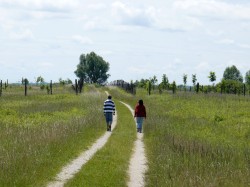Press Release, 09. November 2016
Assessing ecosystem services in Europe on good track
Ecosystems contribute to human well-being in many ways. The European Union is therefore taking efforts through its Member States to record and assess the state of the ecosystem services in national reports. An international research team under the direction of UFZ and iDiv has now compared eight national assessments and results are published in the October issue of the journal Bioscience. The scientists conclude that the national assessments are an important tool for the conservation of ecosystems and their services in Europe. To further success, the authors recommend a standardisation of assessment methods of ecosystem services in the Member States to allow for better comparison and trend analyses.
The pollination of crops and production of food, the filtering of drinking water or storing of carbon - these are all examples of ecosystem services, i.e. benefits that human derive from ecosystems. People who find peace and relaxation in a park or forest also use ecosystem services. In addition to the intrinsic value of biological diversity, the immense importance of nature’s services to humanity is a central motivation for nature conservation. The European Union Biodiversity Strategy therefore outlines a number of targets to stop biodiversity loss that include the mapping and assessing of the state of ecosystems and their services to help inform policy decisions affecting the environment. The aim is to better understand the value of ecosystem services and to be able to track changes over time. "The ecosystem services need to match the national reports in a similar way as the economic performance of a country is matched with the gross domestic product (GDP)", explains Dr. Matthias Schröter, lead author of the study, in which the scientists have now analysed the reports that have been published so far. Like Prof. Aletta Bonn, Director of Studies, Schröter is affiliated with the Helmholtz Centre for Environmental Research (UFZ) and the German Centre for Integrative Biodiversity Research (iDiv).
There are major differences in how individual Member States implement their national surveys of ecosystem services. The scientists compared eight national reports that have been presented so far. "There is no uniform standard, and countries comply with the requirements of the European Commission in very different ways. Some countries create maps, others design additional future scenarios or measure the development of ecosystem services over time", says Aletta Bonn. The international team of scientists state that national reports are a very important tool for the protection of biodiversity and ecosystem services. As a next step, a standardisation of the methods and indicators could lead to a better comparability of the different national reports, as well as a comprehensive recording system across Europe. At present, the specifications from the European Commission are not yet specific. Consequently, the eight reports differ in terms of which ecosystem services are taken into account and how they are evaluated. Services that are especially well studied and have been recorded in all eight countries include the provision of food, drinking water and raw materials (such as wood or biomass), carbon storage, as well as the recreational values of ecosystems.
Within the most comprehensive reports from Spain, Britain and Flanders (Belgium), large teams of scientists have compiled information about the current state of ecosystem services and their economic valorisation. Germany is represented by an exploratory study that proposes indicators for recording ecosystem services and summarises initial surveys. "This is an important step and a very good starting point for recording ecosystems and their services", says Aletta Bonn. At a national level, the initial study could serve as a basis to close more knowledge gaps, adds Matthias Schröter: "What is the actual status of ecosystems and biological diversity - the basis of ecosystem services? How can we record developments over time? How do certain ecosystem services interact - does one service diminish while another increases? And how can the findings be translated into policies and management tools? These are the issues that need to be addressed over the coming years."
Publication:
Matthias Schröter, Christian Albert, Alexandra Marques, Wolke Tobon, Sandra Lavorel, Joachim Maes, Claire Brown, Stefan Klotz & Aletta Bonn (2016): National Ecosystem Assessments in Europe: A Review. BioScience 66 (10): 813-828. doi: 10.1093/biosci/biw101 (Open Access)
Further Link:
European Commission: http://ec.europa.eu/environment/nature/knowledge/ecosystem_assessment/index_en.htm
Further information
Prof. Dr. Aletta Bonn
Head of the Department Ecosystem Services at UFZ and iDiv
aletta.bonn@ufz.de
Dr. Matthias Schröter
Postdoctoral researcher in the Department Ecosystem Services at UFZ and iDiv
Phone: +49 341 9733199
matthias.schroeter@ufz.de
UFZ press office
Susanne Hufe
Phone: +49 341 6025-1630
presse@ufz.de
In the Helmholtz Centre for Environmental Research (UFZ), scientists conduct research into the causes and consequences of far-reaching environmental changes. Their areas of study cover water resources, ecosystems of the future, environmental technologies and biotechnologies, the effects of chemicals in the environment, modelling and social-scientific issues. The UFZ employs more than 1,100 staff at its sites in Leipzig, Halle and Magdeburg. It is funded by the Federal Government, Saxony and Saxony-Anhalt.
www.ufz.deThe Helmholtz Association contributes to solving major challenges facing society, science and the economy with top scientific achievements in six research fields: Energy; Earth and Environment; Health; Key Technologies; Matter; and Aeronautics, Space and Transport. With some 39,000 employees in 19 research centres, the Helmholtz Association is Germany’s largest scientific organisation.
www.helmholtz.de
